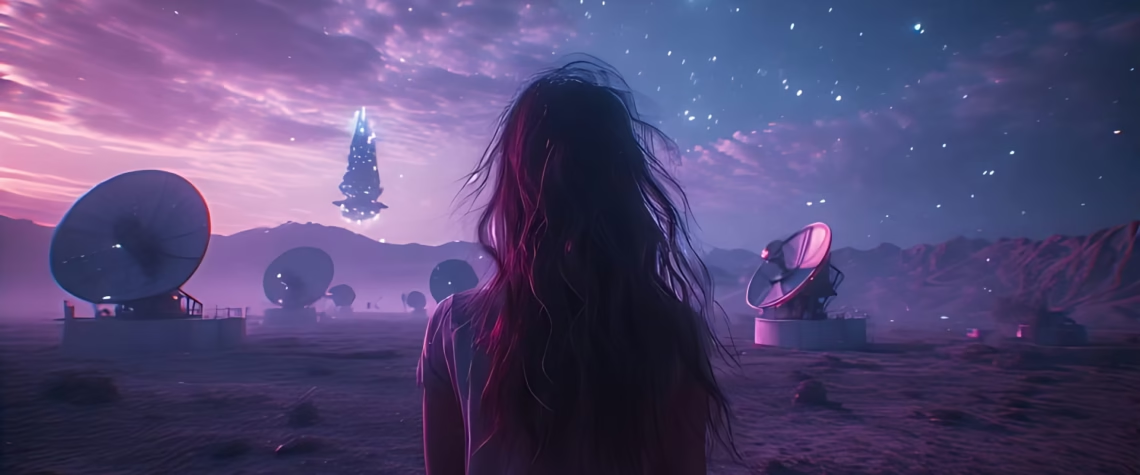The Great Silence is not out there. It’s inside us.
The Great Silence is not just about what we hear from space; it’s also about our understanding.
We look to the sky, asking, “Where is everyone?” However, this question is flawed. It assumes that aliens should be here and that we’re equipped to find them.
The Fermi Paradox highlights this loneliness in the cosmos, suggesting that intelligent life should be common given the size and age of the universe.
But all we hear is silence, leading us to believe they’re not reaching out.
But what if the silence is ours? What if our tools work, but we can’t recognize the signals?
THE PERCEPTION PRISON
We must confront our most significant limitation: ourselves.
The Hypothesis of Perceptual Limitation suggests that human consciousness is not like a clear window; it’s more like a small keyhole.
It developed to help us find food, avoid danger, and protect our communities, not to perceive reality fully. Our biology limits us.
We can only see a tiny fraction of the electromagnetic spectrum.
We hear selective sounds and feel time because of entropy pushing us forward. Other realities, different dimensions, and forms of consciousness exist, but our brains are not built to detect them.
Aliens may not be absent; they could be beyond our perception, operating on wavelengths we still can’t identify. We stand on the shore of the cosmic ocean, dip a finger in the water, and declare the absence of whales.
THE COSMIC BLINDSPOT
We expect aliens to look like us or to communicate in our way.
We think they’ll follow our rules of physics and math. But what if our expectations are the problem?
We search for intelligent life like a bacterium waiting for tiny podcasts from NASA.
If the universe is made of consciousness, if quantum physics shows that observation impacts reality, then it’s not wild to think there could be entire beings or civilizations made from forms of perception we can’t see.
We can call them extra-dimensional entities or something else, but we label them as missing simply because we can’t perceive them.
There’s a big irony here: aliens aren’t silent; they just differ from what we understand.
THE GREAT IRONY: THE MESSAGE WAS ALWAYS HERE
Perhaps the message from other civilizations has already arrived. It might be flowing through time and woven into the very fabric of our particles and dreams.
It could connect to experiments like the double-slit experiment, where conscious observation shapes reality.
Maybe it exists in the mystical experiences we dismiss as mere hallucinations.
Those UFOs we joke about might not be ships but signs of our blind spots.
We’re like larvae, wrapped in flesh, caught in our egos, and distracted. We aren’t ready to meet other intelligences, as we still struggle to understand ourselves.
DARK MATTER, DARK HUMOR
Eighty-five percent of the universe is made of something we can’t see, which we call dark matter.
However, calling it “dark” doesn’t change our relationship with it. The real humor might be on us.
What if dark matter isn’t dark? What if it just vibrates on a different level?
It’s like a symphony playing everywhere while we only hear the drums.
This isn’t just physics; it shows a more profound truth. We build telescopes to see light, but maybe the universe communicates in shadows.
We chase technologies to travel through space, but forget to focus on the moment.
We argue about how life might begin, ignoring that our version is only one possibility.
The universe may be full of intelligence; we just can’t see it without changing our perspectives.
THE FINAL FRONTIER: INWARD
Before searching the universe, we must look within ourselves.
This isn’t just a nice idea; it’s necessary. The true frontier is our consciousness.
It’s unexplored and shapes how we perceive everything else.
If our minds are limited, if our understanding is narrow, then the silence isn’t a mystery; it’s a reflection.
The important questions aren’t just “Where are the aliens?” but “What are we missing?” “Who are we without our limitations?” “What would we notice if we changed our perspective?”
THE CLOSING TRANSMISSION
We are not alone. We never have been.
However, we must change who we are to find and recognize other intelligences.
We must adjust our perceptions, broaden our understanding, and rethink our sense of self.
Until we do this, we remain like organisms inside a snow globe, shouting at a universe we have yet to learn to listen to. The silence isn’t just a barrier.
![]()


